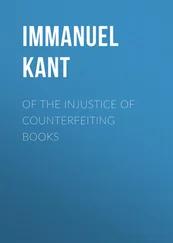Metaphysics of Ethics , which, with his
Anthropology , completed in 1798, were the last considerable works that he revised with his own hand. His
Lectures on Logic , on
Physical Geography , on
Paedagogics , were edited during his lifetime by his friends and pupils. By way of asserting his right to resume theological disquisition, he also issued in 1798 his
Strife of the Faculties , in which all the strongest points of his work on religion were urged afresh, and the correspondence that had passed between himself and his censors was given to the world.
From the date of his retirement from the chair Kant declined in strength, and gave tokens of intellectual decay. His memory began to fail, and a large work at which he wrought night and day, on the connexion between physics and metaphysics, was found to be only a repetition of his already published doctrines. After 1802, finding himself attacked with a weakness in the limbs attended with frequent fits of falling, he mitigated the Spartan severity of his life, and consented to receive medical advice. A constant restlessness oppressed him; his sight gave way; his conversation became an extraordinary mixture of metaphors; and it was only at intervals that gleams of his former power broke out, especially when some old chord of association was struck in natural science or physical geography. A few days before his decease, with a great effort he thanked his medical attendant for his visits in the words, “I have not yet lost my feeling for humanity.” On the 12th of February 1804 he died, having almost completed his eightieth year. His stature was small, and his appearance feeble. He was little more than five feet high; his breast was almost concave, and, like Schleiermacher, he was deformed in the right shoulder. His senses were quick and delicate; and, though of weak constitution, he escaped by strict regimen all serious illness.
His life was arranged with mechanical regularity; and, as he never married, he kept the habits of his studious youth to old age. His man-servant, who awoke him summer and winter at five o'clock, testified that he had not once failed in thirty years to respond to the call. After rising he studied for two hours, then lectured other two, and spent the rest of the forenoon, till one, at his desk. He then dined at a restaurant, which he frequently changed, to avoid the influx of strangers, who crowded to see and hear him. This was his only regular meal; and he often prolonged the conversation till late in the afternoon. He then walked out for at least an hour in all weathers, and spent the evening in lighter reading, except an hour or two devoted to the preparation of his next day's lectures, after which he retired between nine and ten to rest. In his earlier years he often spent his evenings in general society, where his knowledge and conversational talents made him the life of every party. He was especially intimate with the families of two English merchants of the name of Green and Motherby, where he found many opportunities of meeting ship-captains, and other travelled persons, and thus gratifying his passion for physical geography. This social circle included also the celebrated J. G. Hamann, the friend of Herder and Jacobi, who was thus a mediator between Kant and these philosophical adversaries.
Kant's reading was of the most extensive and miscellaneous kind. He cared comparatively little for the history of speculation, but his acquaintance with books of science, general history, travels and belles lettres was boundless. He was well versed in English literature, chiefly of the age of Queen Anne, and had read English philosophy from Locke to Hume, and the Scottish school. He was at home in Voltaire and Rousseau, but had little or no acquaintance with the French sensational philosophy. He was familiar with all German literature up to the date of his Kritik , but ceased to follow it in its great development by Goethe and Schiller. It was his habit to obtain books in sheets from his publishers Kanter and Nicolovius; and he read over for many years all the new works in their catalogue, in order to keep abreast of universal knowledge. He was fond of newspapers and works on politics; and this was the only kind of reading that could interrupt his studies in philosophy.
As a lecturer, Kant avoided altogether that rigid style in which his books were written. He sat behind a low desk, with a few jottings on slips of paper, or textbooks marked on the margin, before him, and delivered an extemporaneous address, opening up the subject by partial glimpses, and with many anecdotes or familiar illustrations, till a complete idea of it was presented. His voice was extremely weak, but sometimes rose into eloquence, and always commanded perfect silence. Though kind to his students, he refused to remit their fees, as this, he thought, would discourage independence. It was another principle that his chief exertions should be bestowed on the intermediate class of talent, as the geniuses would help themselves, and the dunces were beyond remedy.
Simple, honourable, truthful, kind-hearted and high-minded as Kant was in all moral respects, he was somewhat deficient in theregion of sentiment. He had little enthusiasm for the beauties of nature, and indeed never sailed out into the Baltic, or travelled more than 40 miles from Königsberg. Music he disregarded, and all poetry that was more than sententious prose. His ethics have been reproached with some justice as setting up too low an ideal for the female sex. Though faithful in a high degree to the duties of friendship, he could not bear to visit his friends in sickness, and after their death he repressed all allusion to their memory. His engrossing intellectual labours no doubt tended somewhat to harden his character; and in his zeal for rectitude of purpose he forgot the part which affection and sentiment must ever play in the human constitution.
On the 12th of February 1904, the hundredth anniversary of Kant's death, a Kantian society ( Kantgesellschaft ) was formed at Halle under the leadership of Professor H. Vaihinger to promote Kantian studies. In 1909 it had an annual membership of 191; it supports the periodical Kantstudien (founded 1896; see Bibliography, ad init. ).
The Writings of Kant
No other thinker of modern times has been throughout his work so penetrated with the fundamental conceptions of physical science; no other has been able to hold with such firmness the balance between empirical and speculative ideas. Beyond all question much of the influence which the critical philosophy has exercised and continues to exercise must be ascribed to this characteristic feature in the training of its great author.
The early writings of Kant are almost without exception on questions of physical science. It was only by degrees that philosophical problems began to engage his attention, and that the main portion of his literary activity was turned towards them. The following are the most important of the works which bear directly on physical science.
1. Gedanken von der wahren Schätzung der lebendigen Kräfte (1747); an essay dealing with the famous dispute between the Cartesians and Leibnitzians regarding the expression for the amount of a force . According to the Cartesians, this quantity was directly proportional to velocity; according to their opponents, it varied with the square of the velocity. The dispute has now lost its interest, for physicists have learned to distinguish accurately the two quantities which are vaguely included under the expression amount of force, and consequently have been able to show in what each party was correct and in what it was in error. Kant's essay, with some fallacious explanations and divisions, criticizes acutely the arguments of the Leibnitzians, and concludes with an attempt to show that both modes of expression are correct when correctly limited and interpreted.
Читать дальше












